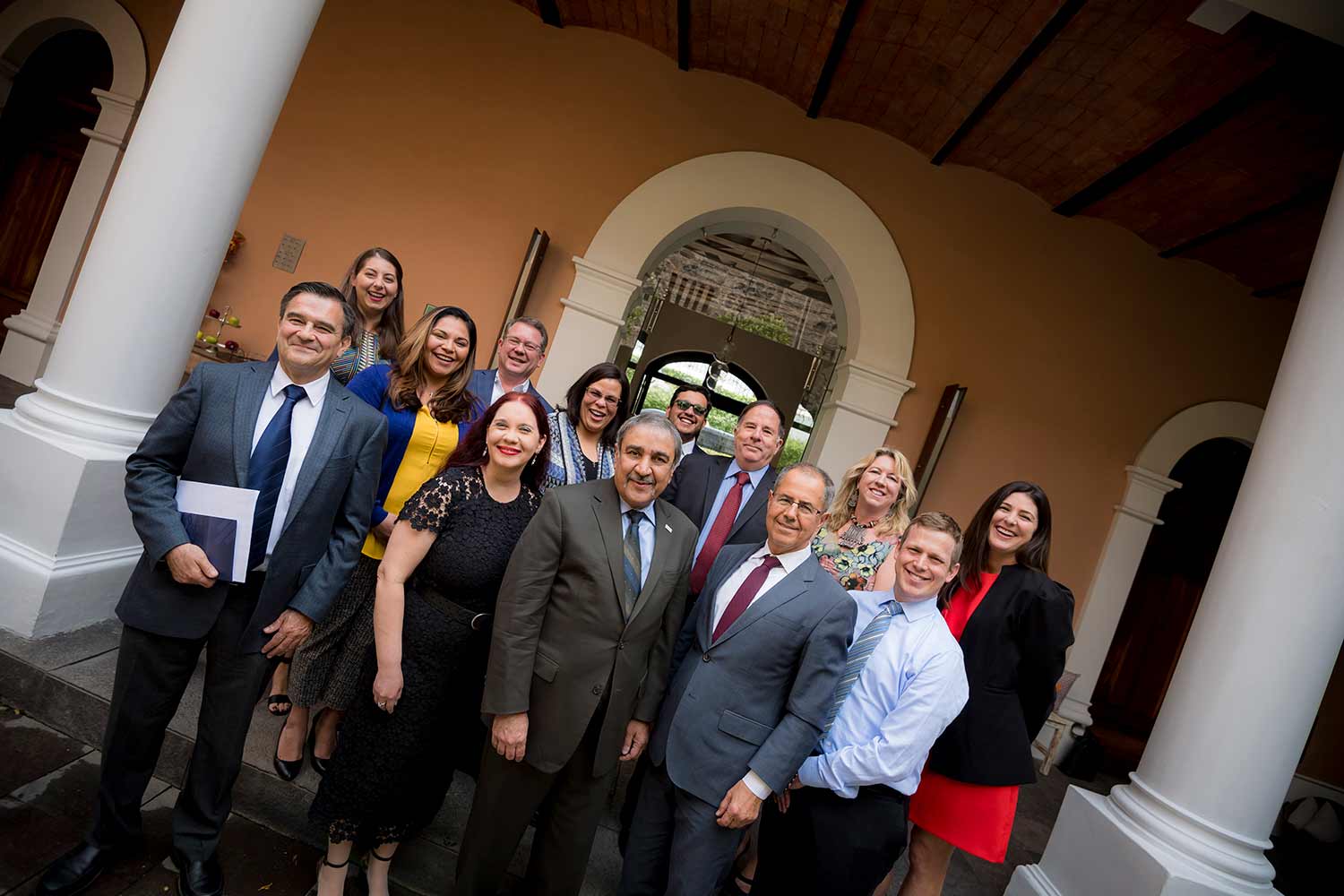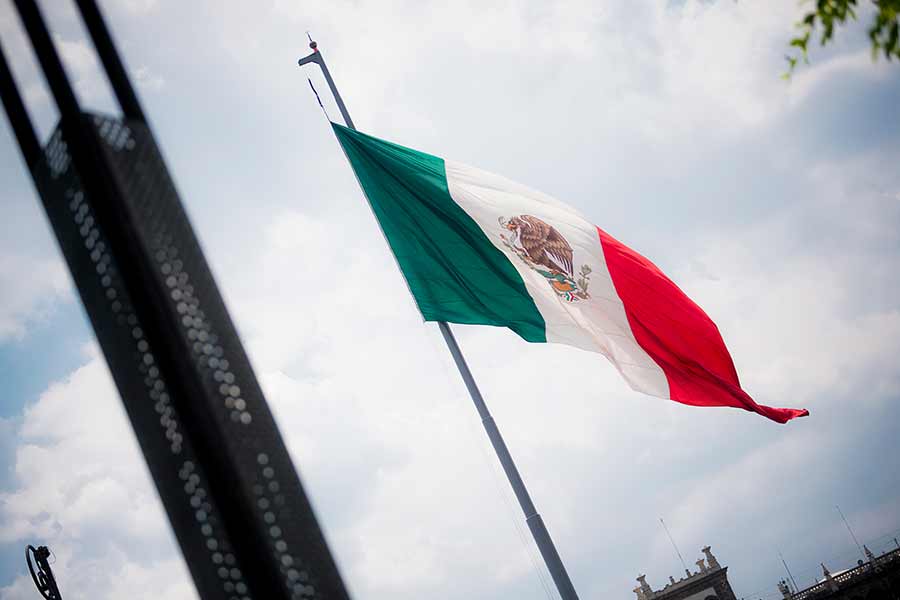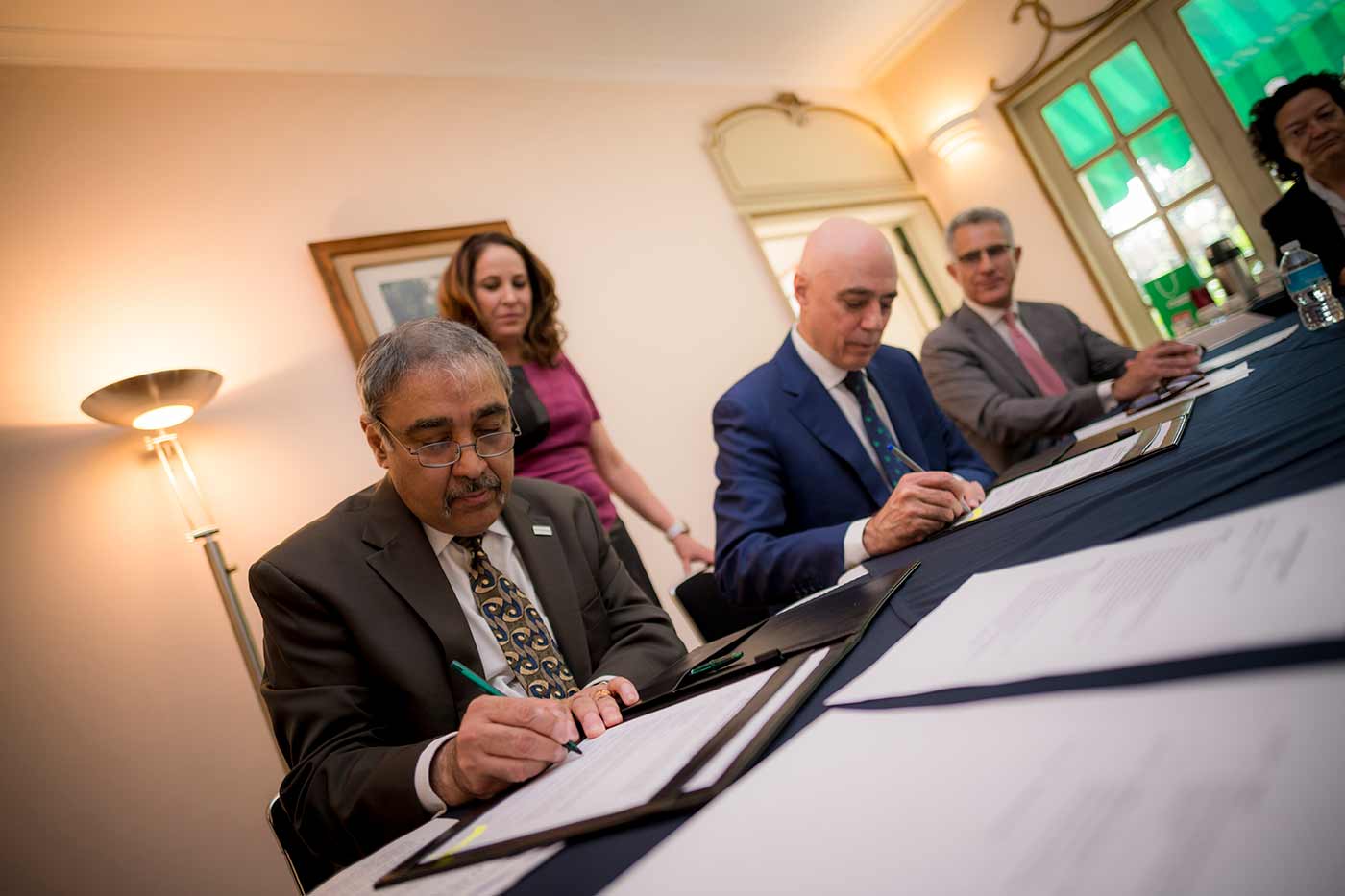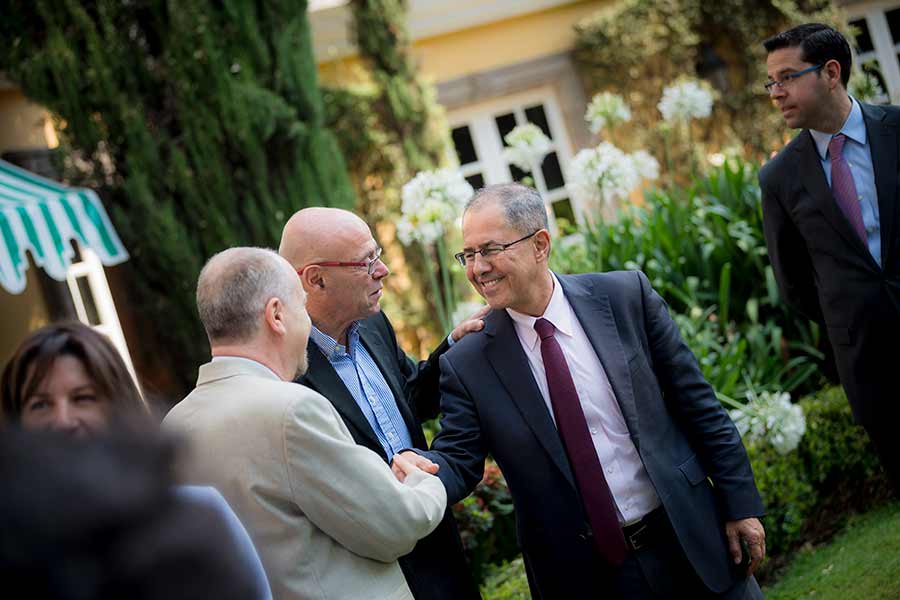
By:
- Michelle Franklin
Published Date
By:
- Michelle Franklin
Share This:

Professor Olivia Graeve, Chancellor Pradeep K. Khosla, and Professor Rafael Fernandez de Castro with UC San Diego delegation in Mexico City.
UC San Diego y México: Better Together
UC San Diego collaborations across the border promote research and understanding
The University of California San Diego lies less than 30 miles north of the San Ysidro Port of Entry—the busiest land border crossing in the Western Hemisphere. Every day, more than 70,000 vehicles and 20,000 pedestrians cross the San Ysidro border between Mexico and the United States for work, travel and education.
Earlier this month, UC San Diego leadership and faculty traveled to Mexico City for two days of events that highlighted the special relationship the university enjoys with Mexico and the unique opportunities that lie ahead. Programs included the first-ever alumni event in Mexico, a symposium that focused on the themes of binational mobility and workforce development and binational border health, and an MOU-signing with Instituto Tecnológico Autónomo de México (ITAM).

During the alumni event, Chancellor Pradeep K. Khosla spoke to an audience of over 100 about the university’s growing connection to Mexico. Last fall, UC San Diego had a record 19,895 international student applications—the most of any University of California campus—and in the last decade, the student population from Mexico has grown 52 percent. In 2021, when the UC San Diego Blue Line Trolley extension is completed, there will be a direct route from the campus to the border, further enforcing the strong bonds that already exist.
In his opening remarks, Khosla stated, “We’ve built a strong foundation with Mexico through collaborative relationships with academic institutions, government agencies, nonprofit organizations and industry partners. Together, we’re working to solve mutual problems related to health, education, the environment, security, inequality and commerce.”
One such collaboration is the new Alliance for Binational Border Solutions. The alliance brings together universities on both sides of the border to develop and implement smart-technology solutions for long-standing trans-border issues such as urban resilience and water management. They will hold a series of workshops this summer in San Diego and Tijuana.
The binational symposium addressed issues of health care facing both countries. Featuring experts from UC San Diego and Mexico, the first panel focused on common health concerns along the San Diego-Tijuana corridor, provisioning of health screenings for migrants and UC San Diego School of Medicine’s partnership with the Instituto Nacional de Enfermedades Respiratorias to develop Seguro HIV-TRACE—an online app that allows Mexican researchers to track HIV transmission clusters in real time. The keynote was delivered by Dr. Luciano Concheiro Bórquez, Mexico’s undersecretary of higher education. The second panel focused on the importance of educational partnerships and academic mobility in workforce development.

Chancellor Khosla and ITAM President Arturo Fernandez Perez signing the MOU.
UC San Diego’s Senior Director of International Initiatives Robert Schooley attended the symposium and says, “The depth and breadth of expertise that we can bring to the table is shared by only a handful of universities across the globe. By having strong local partners, we gain insights that enable us to use our expertise much more effectively. Local partners almost inevitably have expertise that is complementary to ours, and when we share our knowledge, the insights and skills we gain through collaboration and education allow us to more quickly and efficiently solve the international problems we face.”
Looking to the Future
During his trip, the chancellor proudly mentioned the ways UC San Diego is already partnering with Mexico through education, research and international relations. However, he also kept his eye on the future, expressing the need to positively influence U.S.-Mexico relations in the decades to come.
One step toward that positive future occurred when UC San Diego and ITAM signed a memo of understanding (MOU). The MOU will encourage student exchanges, internships and joint research projects. The two universities already have shared history as ITAM graduates have earned master’s degrees from UC San Diego’s School of Global Policy and Strategy (GPS). The GPS Center for U.S.-Mexican Studies also has many ITAM participants in its residential fellowship program.

Professor Rafael Fernandez de Castro (r) shaking hands with ITAM Professor Stephan Sberro (l) at the MOU signing.
Both universities also participate in a binational summer program called ENLACE. The program encourages high school and college students to participate in STEM-based research. Students from both sides of the border interested in science and engineering come to UC San Diego’s campus for a summer program that provides exposure to everything from nanoengineering and marine biology to the methodology of conducting research.
Director of GPS’s Center for U.S.-Mexican Studies Rafael Fernández de Castro states, “The MOU signed by Chancellor Khosla and ITAM President Arturo Fernández has enormous potential for research collaboration and student exchanges. We will begin seeing that potential reach fruition beginning this summer and look forward to deepening our relationship with ITAM.”
This summer, GPS will launch a program called “U.S. Political Institutions and U.S.-Mexico Relations” that will be open to ITAM students. ITAM’s summer program, “Business in a Globalized Mexico” will also host students from San Diego. The three-week program will blend finance and business with Mexico’s history and culture.
The bond between the United States and Mexico is undeniable: whether it’s the hundreds of thousands of people who cross the borders each day; the cultural influence that is felt in the border cities and towns; or the mutual desire to solve the issues confronting both countries. Now, the education and research goals UC San Diego shares with its many partners to the south light a path forward to solving those issues and creating a foundation for understanding and friendship.
Schooley summarized it by saying, “Each small tree we plant with international partners has the potential to become a forest down the road.”
Share This:
You May Also Like
Stay in the Know
Keep up with all the latest from UC San Diego. Subscribe to the newsletter today.


